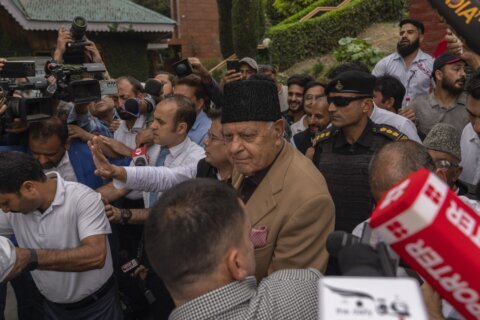A death can feel catastrophic and overwhelming, not only for mourners who loved the deceased person but also for anyone outside the loss who understands the pain it has caused.
That is one of the most challenging aspects of the mortuary field — an occupation that focuses on showing respect for the dead and their survivors.
Anyone involved in the cemetery, crematory, funeral and memorial business is confronted with the reality of human fragility and mortality on a daily basis. Whether they are doing facial reconstruction, helping the bereaved write an obituary or eulogy, designing a gravestone or cremation urn, or planning a remembrance ceremony, bearing witness to suffering is something they must do regularly.
Licensed workers in this industry often say they are driven by a desire to do good for and bring peace to grief-stricken people. Comforting the heartbroken, demonstrating compassion and healing broken spirits is their professional obligation and personal mission, many say.
Amy Cunningham, a licensed funeral director in Brooklyn, says she appreciates the opportunity to create beautiful and meaningful memorial ceremonies. “It’s almost like each funeral is a written personality profile for a magazine piece,” says Cunningham, the owner of Fitting Tribute Funeral Services Company, who previously worked as a journalist. “You throw yourself into it in the same way, making sure that no detail is neglected and that you haven’t missed the good parts.”
Though in prior generations it was rare for women to enter the mortuary profession and unusual for this occupation to be someone’s second career, those scenarios are fairly common today. Here is a guide for anyone who is interested in attending mortuary school and training for a mortuary career.
[READ: How to Become a Counselor and Why.]
What Degree Programs for Mortuary Science and Funeral Services Cover
Degrees in either mortuary science or funeral services focus on the art and science behind caring for the dead and their loved ones. These academic programs typically include a mix of humanities and science courses that provide insight into death and mourning, and have extensive technical coursework about various anatomical restoration or preservation techniques.
For example, a mortuary school’s classes on psychology might concentrate on the grieving process, its biology or anatomy courses might analyze the postmortem decomposition process, and its chemistry classes might focus on embalming fluids, says Poul Lemasters, a funeral director, embalmer and attorney in Ohio.
“All the courses are tied to end-of-life,” says Lemasters, who is the general counsel at the International Cemetery, Cremation & Funeral Association.
[Read: Alternatives to a Medicine Career — What Premed Students Should Consider.]
What Funeral Workers Do and How They Are Trained
Many people within the mortuary field refer to themselves as morticians, a broad term that encompasses expertise in both embalming and funeral direction. Others in the industry view that term as old-fashioned and prefer to call themselves embalmers, funeral directors or both. Some people in the field focus on handling human remains, while others concentrate on planning memorial ceremonies, but it is possible for mortuary professionals to combine these two tasks with sufficient training.
Within the U.S., mortuary jobs typically require either an associate or bachelor’s degree in funeral service or mortuary science plus licensure within a state or territory, though the requirements differ by region and job (funeral director, embalmer, or both). A bachelor’s degree is mandatory in some areas, but an associate degree may be sufficient in others. A certificate, diploma or a set amount of college or university coursework may fulfill schooling requirements in states with especially lenient licensing rules. And while some states allow funeral workers to receive a license that only pertains to either embalming or funeral direction, other states require a dual license.
Anyone interested in the mortuary field should know that it usually requires coursework at an accredited mortuary school that is recognized by the American Board of Funeral Service Education, or ABFSE. A list of ABFSE-approved programs is available online. Formal education typically must be supplemented with hands-on training via an apprenticeship, internship or residency with an experienced mentor. Candidates must usually pass either a state or national board exam. The most common obligatory test is the one administered by the International Conference of Funeral Service Examining Boards, or ICFSEB.
The best way to gauge whether this occupation is a good fit, experts say, is by speaking with or shadowing funeral workers, or by taking on an assistant-type role or internship (if permitted in your state) prior to attending mortuary school..
Getting some direct experience in the field is essential, says Michael LuBrant, director of the University of Minnesota mortuary science program. “If somebody has never worked in this field before and they simply apply and enroll based on their perceptions of what it may be — based upon what they find online or elsewhere — it’s not uncommon for their perceptions to be different than what they find when they’re actually working in the field, and then they choose to leave,” he says.
Compensation and What It’s Like to Work in Mortuary Science
The median salary among U.S. funeral home managers in 2020 was $74,200, and the typical paycheck for morticians, undertakers and funeral arrangers was $54,100, according to the U.S. Bureau of Labor Statistics.
Hours within this profession tend to be irregular, since deaths can occur at any time. It’s an emotionally taxing profession that can be stressful, but people who do this work say that it can be fulfilling and satisfying for the right kind of person — someone who genuinely enjoys caretaking.
“When people are faced with a death, it’s something that they’ve never experienced before — not that death,” says Robert C. Smith III, executive director of the ABFSE. “There may have been a death of a grandparent or an uncle or a friend or whatever, but it’s a whole lot different when it strikes home to you. And then you’re faced with all of these myriad of decisions and questions that people are asking and so forth.”
Smith says a funeral director plays an important role in the grieving process by assisting mourners with pivotal choices about how to remember their loved ones.
Searching for a college? Get our complete rankings of Best Colleges.
More from U.S. News
How to Go to School to Become an Occupational Therapist
A Guide to MSW Degrees and Becoming a Social Worker
The Best Jobs That Help People
Mortuary School: How to Become a Mortician, Embalmer or Funeral Director originally appeared on usnews.com







